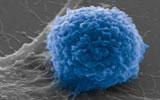Department of Diabetes Complications & Metabolism

The Department of Diabetes Complications & Metabolism, chaired by Rama Natarajan, Ph.D., the National Business Products Industry Endowed Chair in Diabetes Research, is at the forefront of research on the complications of diabetes and metabolic diseases. This department within the Arthur Riggs Diabetes & Metabolism Research Institute at City of Hope uses state-of-the-art computational and systems biology data-analysis methods, genomic and epigenomic profiling approaches, novel transgenic mouse models, and translational approaches with small molecules and modified nucleotides in animal models and humans in its quest to advance the field of diabetes, obesity, diabetic complications and metabolic diseases research. Several investigators are examining the role of epigenetic mechanisms in these pathologies.
Researchers are also studying the molecular links between diabetes, obesity and cancer, and mechanisms by which aberrant metabolism leads to cancer. The department offers scientists and trainees a multidisciplinary environment in these scientific research areas. They work collaboratively not only with faculty within the department, but also those within the Riggs Institute and Beckman Research Institute of City of Hope, as well as nationally and internationally toward a common goal of reducing the burden of diabetes, metabolic diseases and their debilitating complications.
Laboratory Research Highlights
- Rama Natarajan Ph.D., Battling Diabetic Complications: Diabetes is the leading cause of kidney failure and a significant risk factor for other vascular complications, such as atherosclerosis. Dr. Natarajan is working to determine molecular mechanisms and factors driving these complications and to develop strategies to prevent and reverse these complications. Her laboratory studies the role of epigenetics and noncoding RNAs (including microRNAs and long noncoding RNAs) in these pathologies using state-of-the-art sequencing technologies and bioinformatics, and they were one of the first to demonstrate the involvement of epigenetic changes and noncoding RNAs in diabetic complications. They are also evaluating translational approaches using small molecules and potential gene therapy/RNA interference to inhibit key genes associated with diabetic complications. Relevance to human diabetic complications is being assessed in clinical cohorts. She also examines the role of epigenetic mechanisms in the phenomenon of metabolic memory experienced by many diabetic patients, i.e., a memory of prior high sugar and obesity states that predisposes patients to sustained long-term complications long after normal sugar or weight loss is established. The researchers are currently examining crosstalk between the epigenome and transcriptome in regulating key pathways, inflammatory, fibrotic and other genes regulating vascular and renal dysfunction in diabetes. They are also evaluating biomarkers for early detection as well as translational approaches using small molecules and noncoding RNA inhibitors to target key factors associated with diabetic complications.
- David Ann, Ph.D., Nutrition and Cancer Therapy: Metabolically overloaded cancer patients, in general, exhibit reduced survival after chemotherapy, suggesting an important role of nutrient utilization in disease progression. Dr. Ann’s laboratory has put arginine in the driver’s seat for tumor cell proliferation. They are investigating the roles of arginine in supporting mitochondrial oxidative phosphorylation, or OxPhos, and studying how arginine regulates chromatin modifications and gene expression via mitochondria-nucleus crosstalk. Efforts will help to develop a protein-free artificial arginine-free diet to target canonical tumor growth in vivo. Restriction of just one amino acid (e.g., arginine) may be sufficient to kill many cancer cells of different tissues and genetic backgrounds.
- Wendong Huang Ph.D., Molecular Pathways Regulating Metabolism in Diabetes and Cancer: By using both genetically engineered mouse models and molecular pharmacological tools, Dr. Huang’s lab aims to identify novel targets for drug discovery. The current research projects focus on: 1) Identification of novel signaling molecules and pathways in regulating metabolism, diabetes and cancer; 2) small molecules and RNA targeted therapy for diabetes and cancer; and 3) mechanisms underlying bariatric surgery and diabetes therapy.
- Ke Ma, M.D., Ph.D., Circadian Clock-controlled Epigenetic Mechanisms: The broad goal of Dr. Ma’s research is to decipher the molecular pathways by which cell-autonomous clock circuits drive metabolic tissue growth and functional capacity, in order to uncover circadian etiologies underlying metabolic disorders for targeted therapeutic interventions. By combining biochemical and molecular biology approaches with whole-body animal physiology, Dr. Ma’s laboratory applies state-of-the-art technologies in circadian biology to metabolic disease research.
- Dustin Schones, Ph.D., Chromatin Modifications in Metabolic Diseases: The Schones lab is interested in chromatin modifications induced by environmental factors in metabolic diseases, including cancer, diabetes and obesity. They furthermore are examining how environmentally induced chromatin modifications depend on genetic factors. Their work underscores the importance of understanding not only general concepts that govern the human genome to influence phenotype/disease, but also how each individual genome responds to the environment leading to the development of disease.
- Zhen Chen, Ph.D., Targeting Endothelial Dysfunction: Dr. Chen’s lab is examining epigenetic mechanisms mediated by long noncoding RNA in chromatin remodeling and gene expression, and their functional relevance in vascular endothelium, one of the first sites of dysfunction in diabetes and cancer. They are studying hyperglycemia and hypoxia-responsive microRNA and long noncoding RNA in endothelial dysfunction and diabetic vascular complications. In addition, they are examining microRNA-mediated crosstalk between vascular endothelial cells and cancer cells, and the role of microRNA in the cardiorenal syndrome.